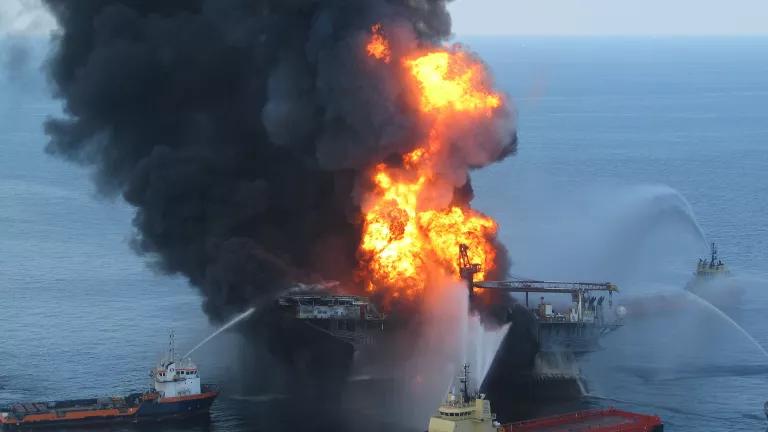Voters in Top Fishing States Want Action to End Illegal Fishing
New poll results show that Pacific Northwest voters want human rights abuses out and seafood traceability in.

Alaskans, Oregonians, and Washingtonians care deeply about where their seafood comes from and whether it was caught legally. Polling results released today show that at least 86 percent of voters view it as highly important for Congress to address the issue of illegal fishing and associated human rights abuses, and overwhelmingly back legislation to address it.
Illegal fishing—short for illegal, unreported, and unregulated (IUU) fishing—refers to fishing that is illegal or occurs outside of fisheries management regimes. Illegal fishing harms endangered marine life, thwarts efforts to manage fisheries sustainably, and often uses exploited or trafficked labor to crew fishing boats or in processing facilities.
Alaska, Oregon, and Washington are a powerhouse of seafood production for the United States, and are therefore among the states with the most to gain from stemming the flow of illegally fished seafood products into the country. These Pacific Northwest (PNW) states account for 70 percent of the volume of seafood landings in the United States annually and bring in nearly 41 percent of the total value of U.S. seafood production.

Impressive though these numbers are, illegally harvested seafood suppresses these states’ earnings by endangering long-term fishery health and distorting the fair market value of their seafood. A recent study showed that removing IUU imports from the U.S. market would have a positive effect on U.S. commercial fishers, with estimated increases in U.S. prices, landings, and operating income of $60.8 million. Our question was, is this an issue that consumers in the Pacific Northwest care about? The answer is a resounding yes.
It’s been almost a decade since the United States pledged to step up its leadership to combat IUU fishing and its linked human rights abuses. While there have been some significant gains in U.S. leadership to stop these environmental and human rights crimes, the United States still has much work to do to fully stop supporting illegal fishing operations, including those that profit from forced and trafficked labor. That’s why NRDC wanted to understand PNW voters’ appetite for legislation to ramp up U.S. leadership on illegal fishing and human rights abuses in the seafood industry.
Respondents overwhelmingly viewed it as highly important for Congress to address the issue of illegal fishing. This is true for nearly 97 percent of Alaska voters and four out of five Oregon and Washington voters. Two issues that polled most strongly were the need for Congressional action to level the playing field for U.S. fishermen by holding imported seafood to a higher standard, and to crack down on seafood produced with forced or trafficked labor.
As shown in Figure 1 below, there was strong support for a suite of specific policy solutions to address IUU fishing and labor abuses in seafood supply chains. Support for the proposal remained overwhelming, even after an exchange of pro and con messaging. More than 7 in 10 respondents continued to support the legislation after hearing pro and con arguments—with around two in five “strongly” in favor. Further, support for a sample legislative proposal was extensive and broad, and it cut across every major demographic group.
Support for Elements of a Proposal for Action on IUU Fishing
I am going to read you some potential elements of this proposal. Please tell me whether you would strongly support, somewhat support, somewhat oppose, or strongly oppose each on.

Figure 1
Many of these policy proposals are included in the House-passed American competitiveness/trade package, called the COMPETES Act (H.R. 4521). The counter-IUU provisions in this bipartisan package use the full strength and resources of the U.S. government to combat the linked illegal fishing and forced labor crises.
These provisions would make seafood fully traceable from the point of harvest to the point of import into the United States, would make fishing operations more transparent, and would make the United States better able to reject seafood from nations that tolerate illegal fishing and labor abuses in the seafood industry.
Over the coming days, the House and Senate are working out the details of their competitiveness bills—the COMPETES Act and the Senate-passed United States Innovation and Competition Act (USICA, S. 1260). Enacting the COMPETES provisions to combat illegal fishing and forced labor through the final innovation and trade package would be a critical step toward protecting our ocean and U.S. consumers who want responsibly sourced seafood.
Policy solutions to tackling illegal fishing and forced labor polled strongly with voters in the Pacific Northwest across demographics. As COMPETES/USICA get negotiated in the coming weeks, members of Congress have a real opportunity to enact legislative solutions to the issues of illegal fishing and forced labor abuses. And voters in Alaska, Oregon, and Washington overwhelmingly support this type of action. To put it simply, no one wants to eat seafood that is illegally caught or associated with human rights abuses.





